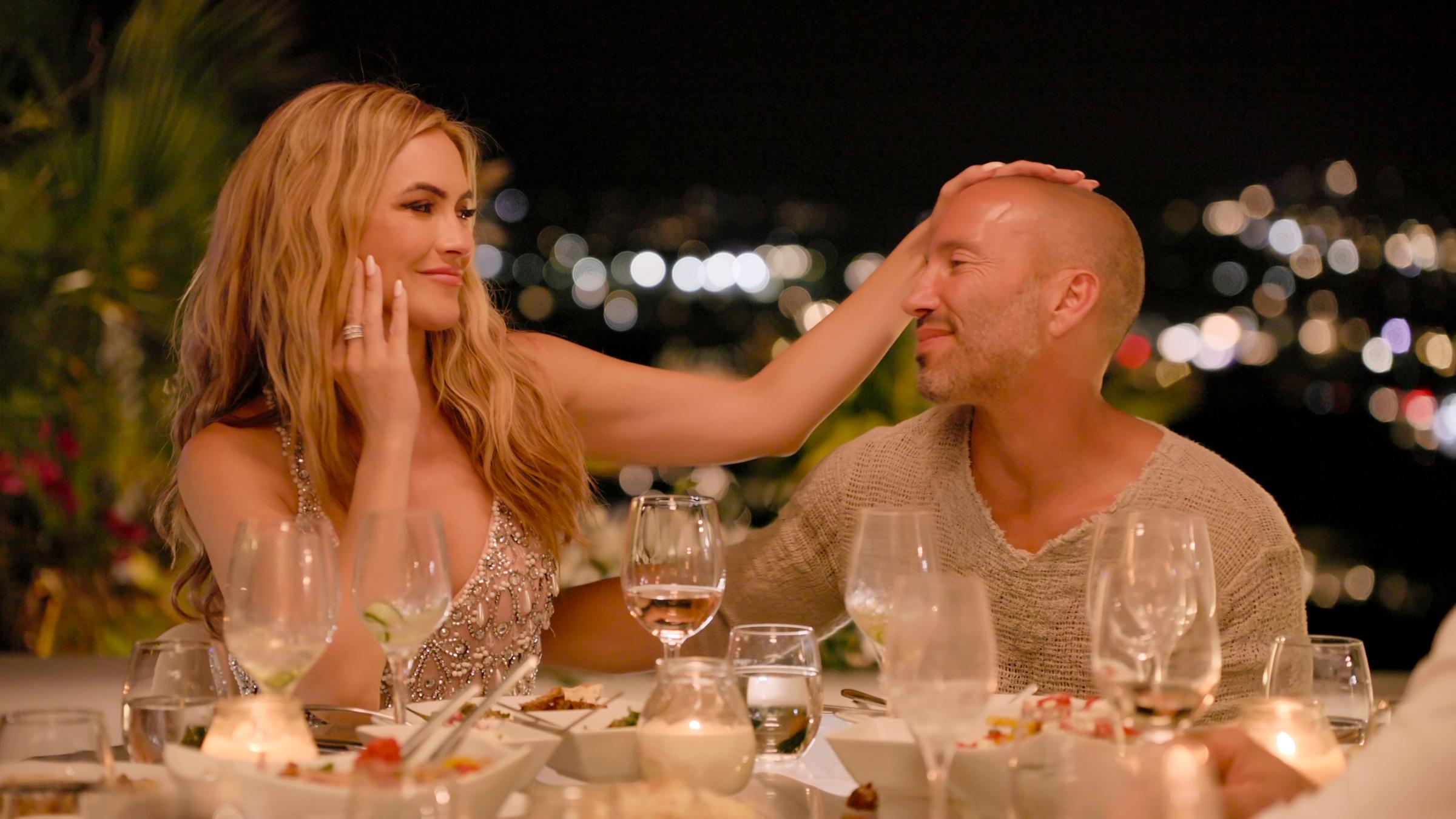This piece contains spoilers for Selling Sunset season 5.
Selling Sunset is the kind of show you turn to for a dose of pure frivolity, only to discover, after a couple episodes, that it has broken your brain. Let me give you an example: When I pressed play on the insanely popular reality series’ fifth season, now on Netflix, I had no investment in the relationship between soap star turned real estate agent Chrishell Stause and Jason Oppenheim, the co-owner of the brokerage that employs Stause and her catty co-stars. My rational brain, the same one that refuses to follow the show’s off-season melodrama in the tabloids, waves a million red flags at the idea of a male boss dating his female employee. But my Selling Sunset brain? It really wanted Chrishell and Jason to get their happily ever after.
That cognitive dissonance makes sense. Although its genre is docusoap, and every episode provides copious quantities of the backstabbing and smack-talking native to the form, Sunset can just as accurately be described as a reality-TV fairy tale. As such, it has the spooky ability to short-circuit (mostly but not exclusively female) minds that absorbed Cinderella and Snow White before they could speak in full sentences. Updated for the 21st century with flashes of girlboss feminism and flickers of prosperity gospel, this is a bedtime story populated by beautiful woman striving to secure wealth, power, and love—to, essentially, become the contemporary American equivalent of a princess. There has been no shortage of real-estate shows, dating shows, or shows about rich, cliquey women in the history of reality television, but this precise combination of elements is unique. And that, I’m increasingly certain, is what keeps so many of us watching.
Every fairy tale needs its heroine, and in Sunset, that role—which surely demands as much acting as any scripted soap-opera part—is played by bright-eyed, bubbly Chrishell. The show opened with her arrival at Jason and his twin brother Brett’s Oppenheim Group, a brokerage that specializes in high-end Hollywood homes, and where everyone who isn’t an Oppenheim is a gorgeous, designer-clad woman who has never worn shoes with less than a 4-inch heel. (Though it rarely comes up on camera, most of the cast members have worked as models or actors. Meanwhile, the O-Group also employs plenty of people who never appear on the show.)

Chrishell comes complete with a Cinderella backstory. She grew up poor and occasionally unhoused, and has talked on the show about how her inconsistent access to the basics of hygiene meant she sometimes went to school smelling foul. But by her mid-20s, the 40-year-old had become a soap star, securing long stints on All My Children and Days of Our Lives. In 2017, she married This Is Us star Justin Hartley. The abrupt end of that union, just two years later, dominated Sunset’s third season. Fans watched Chrishell sob through episode after episode, bringing cameras along to visit family in the Midwest while she mourned what she framed as a sudden abandonment by the man who was supposed to be her Prince Charming. Off camera, the split was bracketed by the cancer-related deaths of her mother and adoptive father.
Amid the latter real adversity that the show restrained itself from crassly televising, Chrishell has also faced a contrived nemesis: Christine Quinn. (It will never stop being funny that these women share half a first name—or that Christine went on to not only marry a man named Christian, but also, er, christen their baby Christian.) A platinum-blonde clotheshorse who’s open about her many cosmetic enhancements, Christine styles herself as a fearless truth-teller among airheaded sycophants. Her apparent inability to stop opining about her co-stars to gossip reporters has lost her ally after ally, to the extent that it seems like the Oppenheims are constantly hiring agents just to give her someone new to confide in, then alienate.
Status handbags, bodycon dresses, and logomania are de rigueur on Sunset, but Christine, with her AbFab-meets-Elle-Woods taste, consistently looks like she’s in costume as a cartoon rich lady. She’ll wear a bubblegum-pink, Chanel-looking bouclé suit to one professional engagement and a leather dominatrix bodice to the next. In one season 5 scene, newcomer Chelsea Lazkani—Christine’s bestie du jour, who refers to herself and Christine as “Black and blonde Barbie”—remarks that Christine’s hairstyle reminds her of Elizabeth Holmes. “I love the scammer vibes for me,” Christine enthuses. “I was going for running-for-office, Ivanka Trump kinda vibes.” In other words: she knows precisely what she’s doing and plays her villain role to the hilt. That doesn’t just make her fun to hate, although she is; it also makes her an ideal fairy-tale villain, salty and sour enough to balance out Chrishell’s saccharine.

This feels especially crucial considering that, in this retelling, the Cinderellas so greatly outnumber the wicked stepsisters. With each new season, we hear from more Oppenheim agents whose hard-luck backstories echo that of their beloved friend Chrishell. Mary Fitzgerald, a veteran employee who dated Jason years ago, was a single mom at 16, working her way through college to support her son. Mary’s longtime friend Amanza Smith has spent several seasons immersed in legal drama with her ex, who has extricated himself from their children’s lives. Season 4 addition Emma Hernan spends part of season 5 trying to buy a $3 million home for working-class parents, who, when Emma was a kid, were “just trying to make ends meet.”
It’s in the O-Group offices that the damsel-in-distress archetype commingles with a strain of contemporary, pro-capitalist feminism. Say what you will about these princesses—they bought their own diamond tiaras. And so there is a lot of empowerment rhetoric on the show, even as it ends most seasons with a heterosexual wedding (as far as we know, all the characters are straight) and perpetuates some of the most noxious stereotypes about women, from materialism to competitiveness to gossip. This leads to such darkly hilarious scenes as the one in the new season that has Amanza introducing her latest design project: “The entire 3,000-square-foot store is about female empowerment. It is everything from female-owned businesses for the retail space to the She I P lounge,” she enthuses. Then Mary and Chrishell show up to trash Christine. It’s moments like this that make me suspect Sunset’s producers are evil geniuses.

What holds this world of contradictory feminine archetypes together is, of course, money. Shaped by past deprivation, the women of Oppenheim are competing in a climate of exaggerated scarcity. (It’s no wonder that the default setting for fairy tales, no matter how long they’ve actually been kicking around in the oral tradition, is feudal Europe.) Here, you either own a Hollywood Hills mansion with an infinity pool, buy a new Chanel purse every week, and fly private, or you’re a destitute failure, unworthy of love and incapable of providing for your family. There is no middle ground. “I like to live a lavish lifestyle,” Chelsea says, by way of explaining why she wants to join the exclusive O-Group. “I’m not going to suffer in this life, ever, so I have to work. Hard.” Whether you frame it as a girlboss’s financial independence or a princess’s fairy-tale ending, in Sunset, ostentatious wealth is presumed to be a prerequisite for happiness.
For Chrishell, that meant freezing her eggs while she built her career. Having checked off home ownership on her to-do list, to the tune of $3.3 million, in season 4, she’s finally ready, in the new episodes, to start a family. “I didn’t have the most ideal childhood. Now I’m in a situation where I know I could give a child an amazing life,” she tells Jason, forcing him to decide whether they’ll breed or break up. “I’ve tried to get the success that I have so that I could pour not just my love, but also resources into making sure it would feel like I’m doing important work.”
If you kept up with the headlines about Chrishell and Jason during the show’s hiatus, you went into season 5 already knowing the relationship was doomed. But even if you didn’t, it was a pretty safe bet that Chrishell’s ultimatum wasn’t going to work out the way she’d hoped. When the princess lives happily ever after, the fairy tale we’re all so addicted to has to end. And how could the producers let that happen when Selling Sunset has already been renewed through season 7?
More Must-Reads from TIME
- Caitlin Clark Is TIME's 2024 Athlete of the Year
- Where Trump 2.0 Will Differ From 1.0
- Is Intermittent Fasting Good or Bad for You?
- The 100 Must-Read Books of 2024
- Column: If Optimism Feels Ridiculous Now, Try Hope
- The Future of Climate Action Is Trade Policy
- FX’s Say Nothing Is the Must-Watch Political Thriller of 2024
- Merle Bombardieri Is Helping People Make the Baby Decision
Contact us at letters@time.com